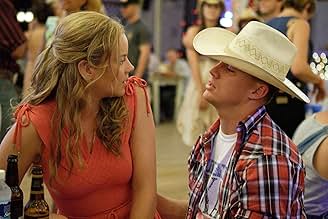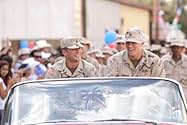A veteran soldier returns from his completed tour of duty in Iraq, only to find his life turned upside down when he is arbitrarily ordered to return to field duty by the Army.A veteran soldier returns from his completed tour of duty in Iraq, only to find his life turned upside down when he is arbitrarily ordered to return to field duty by the Army.A veteran soldier returns from his completed tour of duty in Iraq, only to find his life turned upside down when he is arbitrarily ordered to return to field duty by the Army.
- Director
- Writers
- Stars
- Awards
- 2 wins & 5 nominations total
Connett Brewer
- Curtis
- (as Connett M. Brewer)
- Director
- Writers
- All cast & crew
- Production, box office & more at IMDbPro
Featured reviews
Kimberly Peirce becomes one of the latest directors to try and only marginally succeed in making a compelling film about the Iraq conflict.
Peirce takes on as her subject the military's stop-loss clause, essentially a back door draft by which the military can use fine print in recruits' contracts to prevent them from getting out once their time is up. Peirce obviously feels strongly about the policy, but what should be a hard-hitting drama feels instead like a rather preachy after-school special. She coaxes a nice performance out of Ryan Phillipe, as the soldier who goes AWOL when his stop-loss clause is activated, but she doesn't fare as well with the rest of the cast. The film suffers from confusing editing, that doesn't always make it clear where characters are or how events are related to one another, and the writing at times is weak as well, with character motivations not coming across as clearly as they should.
I don't know what it is about the Iraq conflict that makes it so hard for filmmakers to make good movies about it. Maybe it will have to be over for a while before anyone can begin to approach it with any success.
Grade: B-
Peirce takes on as her subject the military's stop-loss clause, essentially a back door draft by which the military can use fine print in recruits' contracts to prevent them from getting out once their time is up. Peirce obviously feels strongly about the policy, but what should be a hard-hitting drama feels instead like a rather preachy after-school special. She coaxes a nice performance out of Ryan Phillipe, as the soldier who goes AWOL when his stop-loss clause is activated, but she doesn't fare as well with the rest of the cast. The film suffers from confusing editing, that doesn't always make it clear where characters are or how events are related to one another, and the writing at times is weak as well, with character motivations not coming across as clearly as they should.
I don't know what it is about the Iraq conflict that makes it so hard for filmmakers to make good movies about it. Maybe it will have to be over for a while before anyone can begin to approach it with any success.
Grade: B-
A bunch of American army boys waste away their time at camp, horsing around and yelling obscenities at each other while they wait their next posting. The style is gritty and raw. There are no Hollywood glamour shots of pretty boy stars, Ryan Phillippe, Channing Tatum or Joseph Gordon-Levitt; there is just confusion over where their day is headed. Before long, the team is manning a road blockade. Director Kimberly Pierce keeps the framing and the editing tight in this opening sequence and shoots the intensity high into the clear-blue, Iraq sky. Each car that approaches the young, scattered soldiers could be a disaster. One second they're lusting over a girl back home, the next they find themselves in the middle of a full- on ambush. The lot of them all fall into line and show what good soldiers are made of boys that become men in a moment's notice without thinking. And then they fight. Moves are made in as calculated a fashion as is allowed in the back alleys of a foreign land. Some of the men live and some die fighting. Within minutes, STOP-LOSS has you and then without warning, the film suddenly turns into a hip-hop musical montage, establishing the stop- and-start pulse of the film that ultimately leaves it for a loss.
It has been nearly ten years since Pierce made her fearless directorial debut with BOYS DON'T CRY. It was a commanding assault on the viewer's nerves with each scene building panic and mounting anxiety. You were never given a chance to breathe and the tragic story it told became unforgettable as a result. This is why it is all so strange to see her impose breaks upon the viewer. Not only does it grind the flow to a halt in the dirt but it also exposes the need to repackage the current wave of Iraq war themed films. On the one hand, it makes some sense to cut the film together in an MTV-inspired style to market the war to the generation that is actually fighting it (it should also be noted that the film is MTV produced). On the other hand though, this approach subsequently comes across as a compromised version of Pierce's potential vision. That said, perhaps the new design is necessary in order to get the film's important message across and heard.
The message in this latest condemnation of the Iraq war effort is to bring attention to the "stop-loss" process. The term itself refers to the army's right to force soldiers into another tour of duty at the end of the term they voluntarily signed up for. It is only supposed to be invoked when the war is still ongoing so you can imagine the outrage felt by Brandon King (Phillippe) as he is expecting to be signing his discharge papers and is told instead that he is shipping back to Iraq. Infuriated by his government's backdoor approach to get around the lack of a draft, Brandon goes AWOL in search of a way out. While taking advantage of the soldiers that enlisted freely to fight for their country is appalling enough, it becomes even more so when you see how messed up the returning soldiers have become after balancing being boys and being men in such devastating situations. Pierce's subtle presentation of the young men of Middle America is smart enough not to exaggerate their psychological damage but their table manners speak volumes to make her point. These are men who cannot carry on a conversation without recounting atrocious experiences they suffered through and have no concept of how uncomfortable they are making everyone around them. Another tour of duty could reasonably crush them if it doesn't kill them. With that in mind, Brandon's escape is not just warranted but imperative.
At one point, Brandon makes a homecoming speech to the people of his Texas town. Midway, he is overwhelmed by how much he has been affected by the simple sights and smells of his home and he cannot go on. Everything he was fighting for becomes clear to him but a fellow officer interrupts his speech in favor of a more crowd-rousing message. People don't want to face the reality of the war; they just want to hear that their side is winning. And while Pierce's point is important and still firmly made, it is impossible to feel as if this film that took so many years to make is actually the film she intended and not a film that was designed to profit from a specific market. Still, it is worth applauding for providing a product that will be most enjoyed and appreciated by the demographic that is actually fighting on the front lines as opposed to an older generation that until now has been able to just sit back in the theatre and quietly criticize the war from afar.
It has been nearly ten years since Pierce made her fearless directorial debut with BOYS DON'T CRY. It was a commanding assault on the viewer's nerves with each scene building panic and mounting anxiety. You were never given a chance to breathe and the tragic story it told became unforgettable as a result. This is why it is all so strange to see her impose breaks upon the viewer. Not only does it grind the flow to a halt in the dirt but it also exposes the need to repackage the current wave of Iraq war themed films. On the one hand, it makes some sense to cut the film together in an MTV-inspired style to market the war to the generation that is actually fighting it (it should also be noted that the film is MTV produced). On the other hand though, this approach subsequently comes across as a compromised version of Pierce's potential vision. That said, perhaps the new design is necessary in order to get the film's important message across and heard.
The message in this latest condemnation of the Iraq war effort is to bring attention to the "stop-loss" process. The term itself refers to the army's right to force soldiers into another tour of duty at the end of the term they voluntarily signed up for. It is only supposed to be invoked when the war is still ongoing so you can imagine the outrage felt by Brandon King (Phillippe) as he is expecting to be signing his discharge papers and is told instead that he is shipping back to Iraq. Infuriated by his government's backdoor approach to get around the lack of a draft, Brandon goes AWOL in search of a way out. While taking advantage of the soldiers that enlisted freely to fight for their country is appalling enough, it becomes even more so when you see how messed up the returning soldiers have become after balancing being boys and being men in such devastating situations. Pierce's subtle presentation of the young men of Middle America is smart enough not to exaggerate their psychological damage but their table manners speak volumes to make her point. These are men who cannot carry on a conversation without recounting atrocious experiences they suffered through and have no concept of how uncomfortable they are making everyone around them. Another tour of duty could reasonably crush them if it doesn't kill them. With that in mind, Brandon's escape is not just warranted but imperative.
At one point, Brandon makes a homecoming speech to the people of his Texas town. Midway, he is overwhelmed by how much he has been affected by the simple sights and smells of his home and he cannot go on. Everything he was fighting for becomes clear to him but a fellow officer interrupts his speech in favor of a more crowd-rousing message. People don't want to face the reality of the war; they just want to hear that their side is winning. And while Pierce's point is important and still firmly made, it is impossible to feel as if this film that took so many years to make is actually the film she intended and not a film that was designed to profit from a specific market. Still, it is worth applauding for providing a product that will be most enjoyed and appreciated by the demographic that is actually fighting on the front lines as opposed to an older generation that until now has been able to just sit back in the theatre and quietly criticize the war from afar.
Stop-Loss (2008)
**** (out of 4)
Hard hitting, Anti-Iraq film has Ryan Phillippe playing a U.S. soldier who leaves his final mission in Iraq but soon learns he's been stop-lossed, which means the government can break your original contract and send you back to Iraq. Phillippe refuses to go back so he goes AWOL and hits the road with his best friend's girl (Abbie Cornish) while trying to figure out what to do. Over the past few years there have been countless films protesting the Iraq war and all of them have been fair (Lions for Lambs) to really poor (Redacted) but this one here is clearly the best of the bunch but it's also one of the best war movies out there and clearly one of the best of 2008. The movie has a strong stance against the war but it's certainly Pro-Soldier and the film bleeds with love for the young men putting their lives on the line each day. The film opens with a scene in Iraq where the soldiers are working a checkpoint when a group of thugs show up with guns a soon a big battle breaks out and leads to tragedy. I really enjoyed what director Peirce did here by instead of focusing on the violence she clearly wants the viewer to see that these are kids doing this fighting. She makes it clear to us that it's kids doing the shooting and being shot at, which is something people and the media seems to forget. The Anti-Iraq stuff is handled very well and never becomes too preachy unlike many other recent films. I think the film's one problem is that it really should have ran at least an hour longer because the movie not only looks at Phillippe's situation but also two of his friends who are dealing with their own battles on returning home. The film is a lot like The Deer Hunter, a film that took three hours to tell its story, and I think that long running time would have worked well here. The two friends play a major part in the story and an emotional one so I think their stories could have been pushed out a bit further. The performances in the film are all rather remarkable and this is certainly the greatest work I've seen from Phillippe. I don't want to ruin anything but he has to go through all sorts of mental pain in the film and he pulls this off wonderfully well. I think Phillippe has always been a good actor but this film here pushes him to a great one. He really does give a strong, raw and highly emotional performance, which is the heart of the film. Cornish is also very good in her role as is Channing Tatum as the best friend. No matter where you stand on the actual war, that shouldn't keep you away from this film, which is quite original in how it tells its story and most importantly it does pay tribute to these kids who lost their lives on the battle field. This is a very strong and highly emotional film that pushes all the right buttons and really delivers.
**** (out of 4)
Hard hitting, Anti-Iraq film has Ryan Phillippe playing a U.S. soldier who leaves his final mission in Iraq but soon learns he's been stop-lossed, which means the government can break your original contract and send you back to Iraq. Phillippe refuses to go back so he goes AWOL and hits the road with his best friend's girl (Abbie Cornish) while trying to figure out what to do. Over the past few years there have been countless films protesting the Iraq war and all of them have been fair (Lions for Lambs) to really poor (Redacted) but this one here is clearly the best of the bunch but it's also one of the best war movies out there and clearly one of the best of 2008. The movie has a strong stance against the war but it's certainly Pro-Soldier and the film bleeds with love for the young men putting their lives on the line each day. The film opens with a scene in Iraq where the soldiers are working a checkpoint when a group of thugs show up with guns a soon a big battle breaks out and leads to tragedy. I really enjoyed what director Peirce did here by instead of focusing on the violence she clearly wants the viewer to see that these are kids doing this fighting. She makes it clear to us that it's kids doing the shooting and being shot at, which is something people and the media seems to forget. The Anti-Iraq stuff is handled very well and never becomes too preachy unlike many other recent films. I think the film's one problem is that it really should have ran at least an hour longer because the movie not only looks at Phillippe's situation but also two of his friends who are dealing with their own battles on returning home. The film is a lot like The Deer Hunter, a film that took three hours to tell its story, and I think that long running time would have worked well here. The two friends play a major part in the story and an emotional one so I think their stories could have been pushed out a bit further. The performances in the film are all rather remarkable and this is certainly the greatest work I've seen from Phillippe. I don't want to ruin anything but he has to go through all sorts of mental pain in the film and he pulls this off wonderfully well. I think Phillippe has always been a good actor but this film here pushes him to a great one. He really does give a strong, raw and highly emotional performance, which is the heart of the film. Cornish is also very good in her role as is Channing Tatum as the best friend. No matter where you stand on the actual war, that shouldn't keep you away from this film, which is quite original in how it tells its story and most importantly it does pay tribute to these kids who lost their lives on the battle field. This is a very strong and highly emotional film that pushes all the right buttons and really delivers.
Maybe the idea was to show the total hopelessness of the conflict--that it was not really a war but urban warfare, and that there is no way to win or to have a happy ending. But that's just an idea--it's not a movie.
I thought that the set-up was fine. But I am not sure the filmmakers knew where to go with it. Their take on the stop-loss policy is obvious, and it is a message that should be heard. But I think the film would have been more interesting if any character exhibited any real growth during the film. The vets were all depicted as basket cases--the most well-adjusted vet seemed to be the double-amputee--he told us why he would want to go back to Iraq and there was at least some productive purpose that would have been served by his return there.
Perhaps there are soldiers who don't mind being stop-lossed--who truly believe they are accomplishing something positive over there. It would have been refreshing to have a character like that--a non-basket case. It would have been good to hear arguments supporting the stop-loss program (if there are any).
The last 20-30 minutes of this film were baffling. The end of the film (not an ending, just an end) was very unsatisfying.
Ryan Philippe did a competent job, but rarely conveyed anything not apparent from the lines or situation. For example, you could see that a lot of his post-war angst was attributable to guilt. How that tied in with the ending is just a mystery to me.
I recall that a very similar military policy was explored by Joseph Heller in Catch-22. I think a comparison to that novel and film is more apt than comparing this to The Deer Hunter.
I wish this film could have been much better than it was.
I thought that the set-up was fine. But I am not sure the filmmakers knew where to go with it. Their take on the stop-loss policy is obvious, and it is a message that should be heard. But I think the film would have been more interesting if any character exhibited any real growth during the film. The vets were all depicted as basket cases--the most well-adjusted vet seemed to be the double-amputee--he told us why he would want to go back to Iraq and there was at least some productive purpose that would have been served by his return there.
Perhaps there are soldiers who don't mind being stop-lossed--who truly believe they are accomplishing something positive over there. It would have been refreshing to have a character like that--a non-basket case. It would have been good to hear arguments supporting the stop-loss program (if there are any).
The last 20-30 minutes of this film were baffling. The end of the film (not an ending, just an end) was very unsatisfying.
Ryan Philippe did a competent job, but rarely conveyed anything not apparent from the lines or situation. For example, you could see that a lot of his post-war angst was attributable to guilt. How that tied in with the ending is just a mystery to me.
I recall that a very similar military policy was explored by Joseph Heller in Catch-22. I think a comparison to that novel and film is more apt than comparing this to The Deer Hunter.
I wish this film could have been much better than it was.
'Stop-Loss' deals with the problems soldiers have in getting out of the army; both through the technical procedure of "Stop-Loss", whereby a solider is sent back for a second consecutive tour of duty, but also through the difficulties of adjusting to civilian life after time on the front line. Many dramas set after the Vietnam war explored the idea that the sense of a victory well won (absent then, as now) might be critical to enabling a soldier to make the transition from combat animal back to member of civic society. The film is well made, powerfully acted, and doesn't pretend that it's characters are angels (although it justly acknowledges their bravery). But it doesn't really go very far beyond its premise, and the ending is given a slightly more upbeat (but inconclusive) spin than could have been applied. The final credits remind us of the startling high number of American troops to have fought in Afghanistan or Iraq in the 21st century; wars that are fought (for good or bad) while the rest of us get on with our lives in an altogether easier place.
Did you know
- TriviaThe title refers to a provision in all military service contracts that says a service member can be involuntarily extended beyond their discharge (from active duty) date, and at times beyond their final discharge from service date, according to the needs of the service.
- GoofsWhen Sgt. King visits Rico, as he pushes his wheel chair out of the sun you can clearly see a bulge in Rico's t-shirt where his real arm is resting.
- Quotes
[from trailer]
Passport Issuer: Here's your new ID. If you go, you're gone for good.
- SoundtracksCourtesy of the Red, White and Blue (The Angry American)
Written by Toby Keith
Details
Box office
- Budget
- $25,000,000 (estimated)
- Gross US & Canada
- $10,915,744
- Opening weekend US & Canada
- $4,555,117
- Mar 30, 2008
- Gross worldwide
- $11,212,953
- Runtime
- 1h 52m(112 min)
- Color
- Sound mix
- Aspect ratio
- 1.85 : 1
Contribute to this page
Suggest an edit or add missing content





































